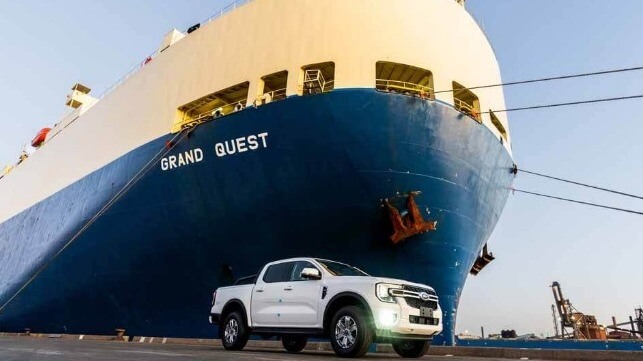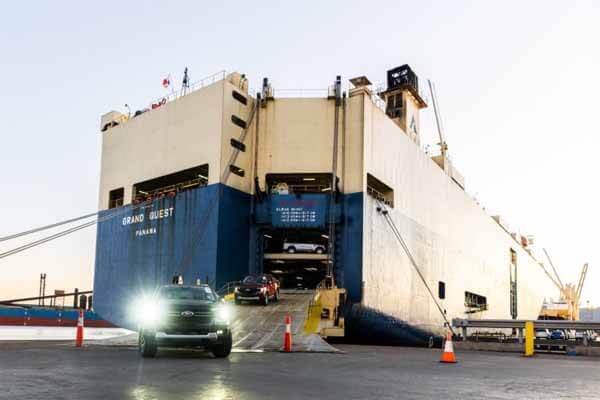Ford Australia Charters RoRo After Apologizing for Long Vehicle Delays

Ford Australia is taking drastic actions to meet a significant surge in car demand and long shipping delays. The company announced today that it is chartering a RoRo car carrier, the Grand Quest, to speed deliveries to the Australian and New Zealand markets from its factory in Thailand.
On its website, Ford Australia has a message for its customers titled at the top of its homepage, “Sorry to keep you waiting.” In a message from President and CEO of Ford Australia, Andrew Birkic, the automaker says, “We know it’s a frustrating time to buy a new car. Global supply chain challenges and shipping congestion have limited deliveries, causing extended wait times across the industry. We sincerely apologize and are committed to being as transparent as possible throughout the process. Rest assured, we’ve got your back.”
The company reports it has entered into a three-year exclusive charter for the Grand Quest to ensure that customers get their vehicles as soon as possible. Apart from speeding deliveries, the deal will also enable the company it hopes to circumvent supply chain bottlenecks by having a dedicated route for the two critical markets. Online, customers are complaining that even after their car ships it is taking two weeks or more for cars to land due to backlogs at the port of Melbourne.
Operated by UK company Polaris Autoliners, Grand Quest can carry up to 2,600 vehicles. The car carrier is 16,702 dwt and was built in 1999. It sails under the flag of Panama. This ship made a trip to Australia and New Zealand in late July-early August and is currently sailing back to Thailand.
Ford Australia contends that leasing the carrier will give it more flexibility to determine shipping routes and volumes by port, thus giving it greater control in managing its supply chains amidst a very challenging environment, particularly across Australian ports.
“Introducing the Grand Quest. It can carry up to 2,600 vehicles, and we’ve leased it for the next three years to deliver Rangers and Everests to customers in Australia and New Zealand. It’s just one way we’re helping customers get their vehicles as soon as we can,” said Ford Australia on the platform X (formerly Twitter).

Car carrier made a trip to Australia and New Zealand bringing Fords from Thailand (Ford Australia)
The decision to charter the carrier comes at a time when Ford is recording a massive surge in demand for units, particularly in the Australian market. In 2022, the company sold 66,628 units in Australia, including 43,128 Ford Rangers and 10,314 Everests. Currently, the waiting time for the two models in Australia ranges from three to 12 months depending on specifications and options.
The models are shipped from Thailand where Ford has invested more than $3.4 billion in a massive production, distribution, sales, and servicing operation for brands designed for the Southeast Asian and Pacific markets. Last year, the company announced a $900 million investment in its Thai production center to boost automation and expand the output of new models including Rangers and Everests and a range of electric vehicles.
Ford Australia is among companies moving to secure its supply chain logistics amidst a global shortage of RoRo capacity due to surging demand in the vehicle transport segment as the auto industry rebounds from the effects of the pandemic.

that matters most
Get the latest maritime news delivered to your inbox daily.
In May, CEVA Logistics announced that it will lease four of Eastern Pacific Shipping’s newbuild vehicle carriers in a deal with its parent company CMA CGM for 10 years. The French company chose to charter to enter the business, while HMM ordered the construction of the company’s first car carriers due to the opportunities it sees in the market.
Wallenius Wilhelmsen, the largest RoRo vessel operator said that rapid growth of electric vehicles, coupled with a rebound in the shipment of heavy equipment, will keep utilization of RoRo carriers at nearly 100 percent in the medium term despite global fleet capacity rising by a quarter over the next two years.
